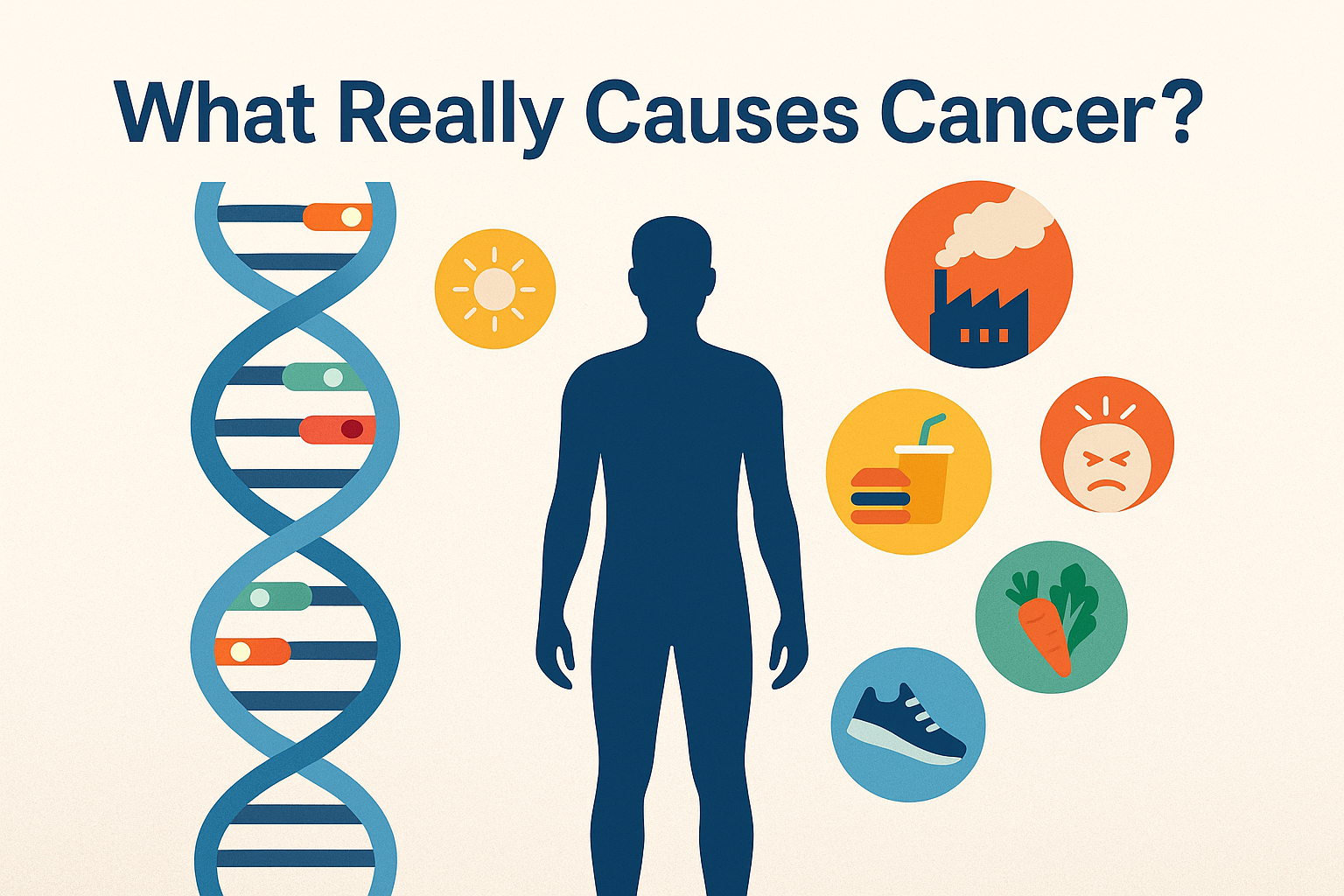What Really Causes Cancer?
When most people think about cancer, they imagine bad luck or “faulty genes.” But the truth is far more complex — and far more hopeful.
While genetics play a role, research now shows that 90–95% of cancers are linked to lifestyle and environmental factors rather than inherited mutations. This means cancer is not simply written into your DNA — and that you have more influence over your health than you may realise.
In this article, we’ll explore the many factors that can trigger cancer, from toxins and infections to stress and diet and why your genes don’t have to be your destiny.
Cancer Is a Whole-Body Condition
Cancer is not a single event but a process that unfolds over many years. Abnormal cells may develop daily in every person’s body. The deciding factor is whether the immune system and internal environment allow them to grow or keep them under control.
When multiple stressors overwhelm the body — toxins, poor diet, chronic stress, infections — the terrain becomes favourable for cancer cells to thrive. Understanding these triggers is key to prevention and healing.
Environmental Toxins: Hidden Triggers
We live in a world filled with chemicals and pollutants that previous generations never faced. These environmental toxins can damage DNA, disrupt hormones, and weaken immunity.
Common cancer-linked toxins include:
Tobacco smoke – Still the leading preventable cause of cancer worldwide.
Heavy metals – Mercury, arsenic, cadmium, and lead can build up in tissues and interfere with cellular function.
Pesticides & herbicides – Found in non-organic food, these chemicals can act as endocrine disruptors and carcinogens.
Radiation – Both ionising (X-rays, CT scans) and non-ionising (EMFs from devices) have been studied for links to cancer risk.
Air pollution – Fine particulate matter has been classified by the WHO as a Group 1 carcinogen.
Reducing exposure wherever possible — by choosing organic foods, filtering water, using natural household products, and limiting unnecessary scans — can lighten the toxic burden.
Infections and Parasites
Few people realise that infections can also play a role in cancer development. Certain viruses, bacteria, and parasites create chronic inflammation that makes cells more vulnerable to mutation.
HPV (Human Papillomavirus): Linked to cervical and throat cancers.
H. pylori: Associated with stomach cancer.
Hepatitis B and C viruses: Major risk factors for liver cancer.
Parasites: Long-term parasitic infections can suppress immune defences and trigger cellular changes.
A strong immune system is the body’s natural barrier to these pathogens, which is why immune support is central to prevention.
Lifestyle Factors That Matter
Beyond toxins and infections, the way we live every day has a profound impact on cancer risk.
Poor diet – Diets high in sugar, processed foods, unhealthy fats, and low in plant nutrients promote inflammation and oxidative stress.
Chronic stress – Long-term stress keeps cortisol elevated, which weakens immunity and disrupts hormonal balance.
Hormonal imbalances – Insulin resistance, estrogen dominance, thyroid dysfunction, and other hormone issues can create cancer-friendly conditions.
Sedentary lifestyle – Lack of movement reduces oxygenation and slows detoxification pathways.
Sleep deprivation – Impairs repair processes and alters immune function.
The encouraging news? These are all modifiable. By changing daily habits, we can dramatically reduce cancer risk.
Epigenetics: Why Genes Are Not Destiny
You may have heard someone say, “Cancer runs in my family.” While this can be true, the emerging science of epigenetics shows that genes are not fixed.
Epigenetics refers to how lifestyle and environment can switch genes on or off. For example:
Smoking can activate cancer-promoting genes.
Exercise and good nutrition can activate protective genes.
Stress can silence tumour-suppressing genes.
This means even if you inherit cancer-related genes, you are not powerless. By making supportive choices, you can influence how those genes behave.
Shifting From Fear to Empowerment
The idea that cancer is caused only by “bad genes” leaves people feeling helpless. But when we recognise the many causes we can influence, the story changes.
Instead of fear, we gain empowerment. Instead of resignation, we find motivation to make changes that reduce risk and improve resilience.
This perspective is at the heart of integrative cancer care: looking beyond the tumour to the terrain of the whole body.
Key Takeaways
Up to 95% of cancers are influenced by lifestyle and environment, not just genetics.
Toxins, infections, poor diet, stress, and hormonal imbalances all contribute.
Epigenetics proves genes are not destiny — your daily choices matter.
Prevention and healing begin with reducing exposures and supporting immunity.
Next Steps
At Cancer Care NZ, we believe knowledge is power. When you understand the many causes of cancer, you can take practical steps to change your terrain and reduce your risk.
👉 Explore more resources in The Healing Room, where we share integrative strategies, patient stories, and practical tips to support you on your journey.

